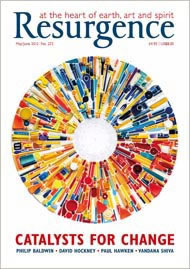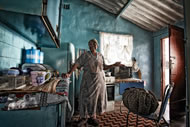Over 3 billion families worldwide cook every day using polluting fossil fuels – that creates a lot of carbon emissions. But South African Sarah Collins’ vision is of “saving the planet... one stew at a time” with her new Wonderbag. Based on the principles of the haybox that she saw her grandmother use, the insulating Wonderbag, made of recycled polystyrene and fabric, allows food that has been brought to the boil on conventional stoves to finish cooking without the use of any additional energy. Rice that is brought to the boil for two minutes on a stove will cook in the Wonderbag in an hour, using no extra fuel. When not in use for cooking, the Wonderbag can keep food cold, using the same insulating principle.
A Wonderbag can reduce fuel use by 30%, alleviating poverty and exposure to toxic smoke from wood-burning stoves. There are now 150,000 Wonderbags in South African homes, saving thousands of tonnes of carbon emissions every year. But Sarah’s vision is not just to make the Wonderbag available throughout Africa, Asia and South America: she believes people in Western countries could benefit in the same way and reduce their escalating fuel bills. “Eco-cooking with Wonderbags makes revolutionary change simple,” she says. “Our worldwide goal is to save 8 million tonnes of carbon emissions within five years.” Because Wonderbag can prove how much less carbon dioxide is emitted through the use of their product, they are now accredited under the UN’s Clean Development Mechanism. This allows them to earn and trade carbon credits, thereby subsidising the price of the Wonderbags, keeping them affordable for people in the global South. It’s eco-cooking that is changing lives for the better.








